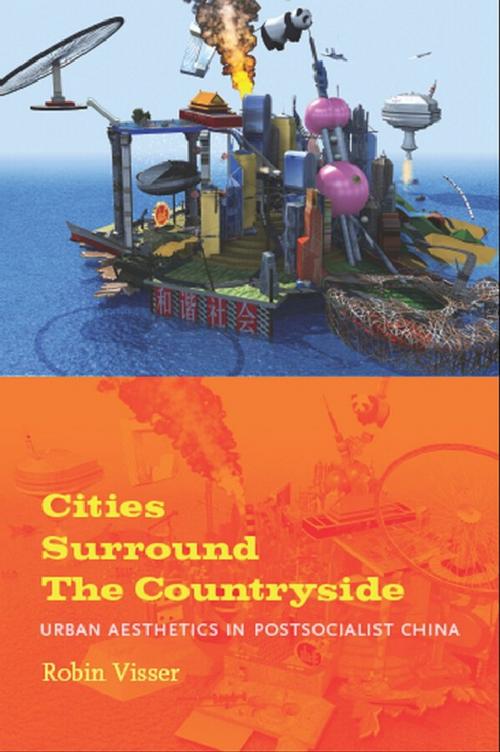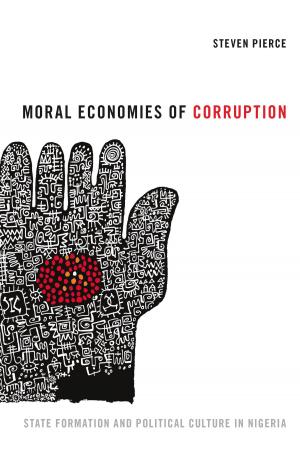Cities Surround The Countryside
Urban Aesthetics in Postsocialist China
Nonfiction, Art & Architecture, Architecture, Planning, History, Asian, China| Author: | Robin Visser | ISBN: | 9780822392774 |
| Publisher: | Duke University Press | Publication: | April 12, 2010 |
| Imprint: | Duke University Press Books | Language: | English |
| Author: | Robin Visser |
| ISBN: | 9780822392774 |
| Publisher: | Duke University Press |
| Publication: | April 12, 2010 |
| Imprint: | Duke University Press Books |
| Language: | English |
Denounced as parasitical under Chairman Mao and devalued by the norms of traditional Chinese ethics, the city now functions as a site of individual and collective identity in China. Cities envelop the countryside, not only geographically and demographically but also in terms of cultural impact. Robin Visser illuminates the cultural dynamics of three decades of radical urban development in China. Interpreting fiction, cinema, visual art, architecture, and urban design, she analyzes how the aesthetics of the urban environment have shaped the emotions and behavior of people and cultures, and how individual and collective images of and practices in the city have produced urban aesthetics. By relating the built environment to culture, Visser situates postsocialist Chinese urban aesthetics within local and global economic and intellectual trends.
In the 1980s, writers, filmmakers, and artists began to probe the contradictions in China’s urbanization policies and rhetoric. Powerful neorealist fiction, cinema, documentaries, paintings, photographs, performances, and installations contrasted forms of glittering urban renewal with the government’s inattention to a livable urban infrastructure. Narratives and images depicting the melancholy urban subject came to illustrate ethical quandaries raised by urban life. Visser relates her analysis of this art to major transformations in urban planning under global neoliberalism, to the development of cultural studies in the Chinese academy, and to ways that specific cities, particularly Beijing and Shanghai, figure in the cultural imagination. Despite the environmental and cultural destruction caused by China’s neoliberal policies, Visser argues for the emergence of a new urban self-awareness, one that offers creative resolutions for the dilemmas of urbanism through new forms of intellectual engagement in society and nascent forms of civic governance.
Denounced as parasitical under Chairman Mao and devalued by the norms of traditional Chinese ethics, the city now functions as a site of individual and collective identity in China. Cities envelop the countryside, not only geographically and demographically but also in terms of cultural impact. Robin Visser illuminates the cultural dynamics of three decades of radical urban development in China. Interpreting fiction, cinema, visual art, architecture, and urban design, she analyzes how the aesthetics of the urban environment have shaped the emotions and behavior of people and cultures, and how individual and collective images of and practices in the city have produced urban aesthetics. By relating the built environment to culture, Visser situates postsocialist Chinese urban aesthetics within local and global economic and intellectual trends.
In the 1980s, writers, filmmakers, and artists began to probe the contradictions in China’s urbanization policies and rhetoric. Powerful neorealist fiction, cinema, documentaries, paintings, photographs, performances, and installations contrasted forms of glittering urban renewal with the government’s inattention to a livable urban infrastructure. Narratives and images depicting the melancholy urban subject came to illustrate ethical quandaries raised by urban life. Visser relates her analysis of this art to major transformations in urban planning under global neoliberalism, to the development of cultural studies in the Chinese academy, and to ways that specific cities, particularly Beijing and Shanghai, figure in the cultural imagination. Despite the environmental and cultural destruction caused by China’s neoliberal policies, Visser argues for the emergence of a new urban self-awareness, one that offers creative resolutions for the dilemmas of urbanism through new forms of intellectual engagement in society and nascent forms of civic governance.















